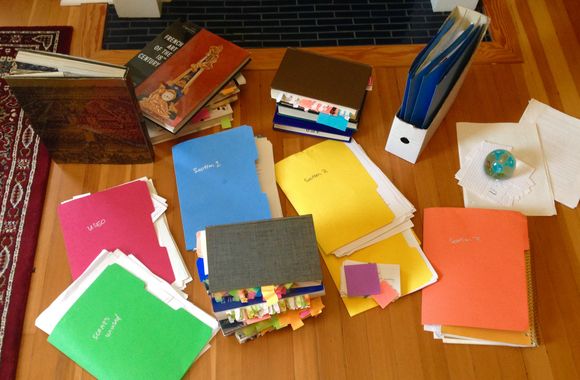Revision Part Two, Long Projects
By Erin Frances Fisher
Short stories, essays, or poems are wonderful to revise—I say this while I’m revising a longer project, but story length does make a difference. You can reading through a short draft in an afternoon, and overhaul an entire section or try out new structures in a few days.
A novel or novella can take a few days simply to read. If the goal is light edits, it will probably take several weeks. It’s difficult to try a new narrator if your project is 60,000-plus words, and keeping track of loose ends, or where you moved bits and pieces, as well as remembering to tackle chores and do your day job, is a challenge.
For these longer projects I find it helpful to think of revision like a crossword: the more sections you fill in the less choices there are going forward.
Still, you have to keep track of the choices. Any researched facts or ideas that don’t have a fixed place I write on notecards. They can be moved around easily, and if I’m stuck on a scene I flip through the pile and they remind me what’s going on in other parts of the project. I write on a computer, but every major overhaul I print off and go through with a pen, highlighter, and scissors, sorting sections into folders and physically moving them around. (If you’re not into the sprawl and mess there is software that can do this. But I find I’m more likely to locate something I’ve forgotten about if its on a post-it.)
Then I type the project again. Once a paper or notecard is in the new draft, the card gets archived.
Your CanLit News
Subscribe to Open Book’s newsletter to get local book events, literary content, writing tips, and more in your inbox
Closer to the end, I read sections against each other. Check if the writing is consistent, if the opening supports the rest of the book, if there are any gaps or any final, finicky bits of research to do. I pull out all the cards and scraps from both used and unused piles, and read through to double check I’ve included everything I wanted to.
A view of the sprawl:
The views expressed in the Writer-in-Residence blogs are those held by the authors and do not necessarily reflect the views of Open Book.
Erin Frances Fisher (MFA UVic, AVCM pedagogy/performance) is a writer and musician in Victoria, BC. Her short story collection THAT TINY LIFE was published by House of Anansi Press, March 2018, was a finalist for the Ethel Wilson Fiction Prize at the 2019 BC Book Prizes, and runner-up for the 2018 Danuta Gleed Literary Award. Her stories have appeared in Granta, The Malahat Review, PRISM international, Riddle Fence, and Little Fiction. She is the 2014 RBC Writer’s Trust Bronwen Wallace Emerging Writers recipient. Erin teaches piano at the Victoria Conservatory of Music, and is a sometimes sessional writing instructor at the University of Victoria.
Website: www.erinfrancesfisher.ca





